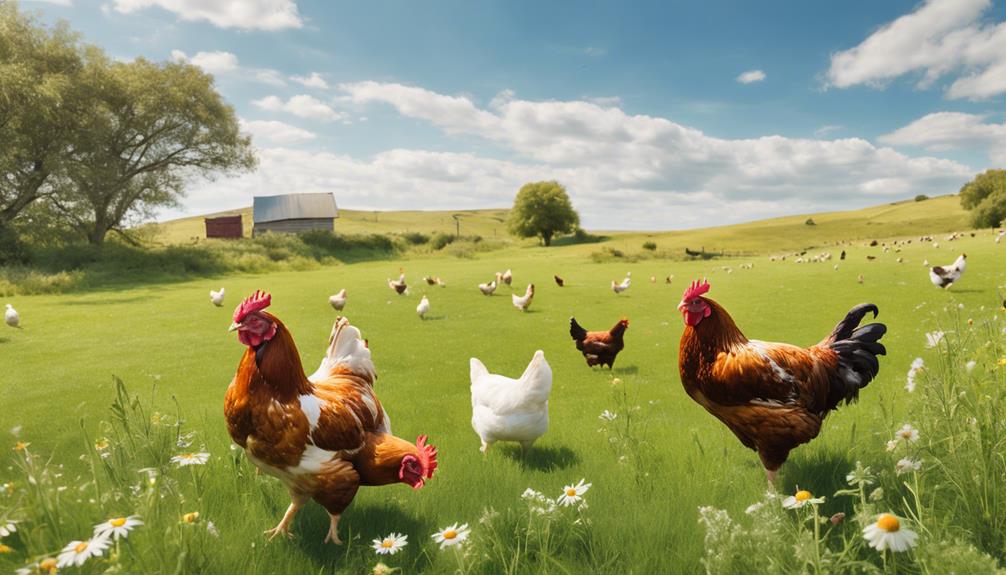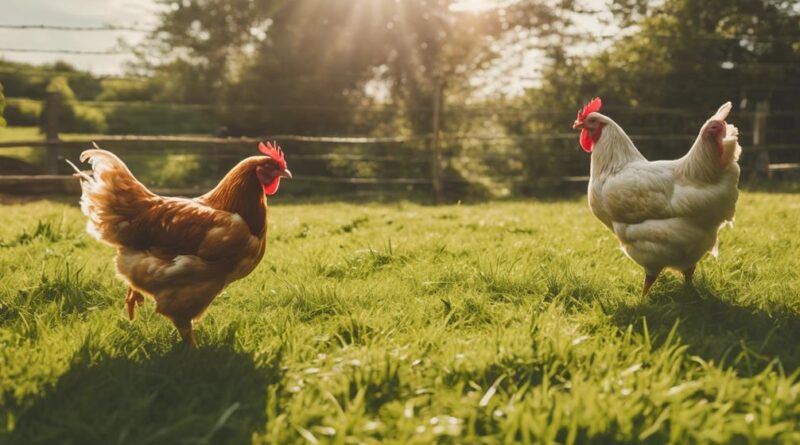7 Health Benefits of Free-Range Over Caged Chickens"
Opt for free-range chickens for 7 key health benefits. You get a richer nutrient profile with essential nutrients in meat and eggs. Enjoy lower contamination risks due to natural living conditions. Higher Omega-3 content means a boost for your heart and brain. Chickens live better lives, producing higher-quality products. Less antibiotic use means healthier birds and combatting resistance. Taste and texture are superior from varied diets. Your choice supports sustainability with positive environmental impacts. Uncover how free-range choices elevate your health and well-being. Your decision extends beyond yourself.
Richer Nutrient Profile
Have you ever wondered why free-range chickens have a richer nutrient profile compared to conventionally raised chickens? The answer lies in the way these chickens are raised. Free-range chickens are allowed to roam outdoors, forage for food, and engage in natural behaviors, which leads to a more varied and nutrient-dense diet.
One key factor contributing to the improved nutrient profile of free-range chickens is their access to a diverse range of food sources. Unlike conventionally raised chickens that are often fed a diet high in corn and soy, free-range chickens have the opportunity to peck at insects, plants, and seeds. This diverse diet results in meat and eggs that are richer in essential nutrients such as omega-3 fatty acids, vitamins A and E, and beta-carotene.
Furthermore, ethical farming practices play a significant role in enhancing the nutrient content of free-range chickens. By allowing chickens to roam freely outdoors, farmers promote physical activity and reduce stress levels in the birds. This stress-free environment can lead to improved taste and texture of the meat, making it a more enjoyable dining experience for consumers.
Lower Risk of Contamination
Lowering the risk of contamination is a significant advantage of consuming products from free-range chickens due to their natural living conditions and dietary choices. Free-range chickens have the opportunity to exhibit natural behaviors like scratching for insects, dust bathing, and pecking at plants. These behaviors not only contribute to the overall welfare of the chickens but also play a role in reducing the risk of contamination in their products.
The enhanced immunity of free-range chickens is another factor that helps lower the risk of contamination in their meat and eggs. When chickens are raised in a free-range environment where they can roam outdoors, they're exposed to a more diverse range of microorganisms. This exposure can stimulate their immune systems, making them more resilient to certain pathogens that could otherwise contaminate their products.
Higher Omega-3 Content
Free-range chickens typically have a higher Omega-3 content in their meat and eggs compared to conventionally raised chickens. Omega-3 fatty acids are essential nutrients that provide various health benefits. These healthy fats play a crucial role in brain function, reducing inflammation, and lowering the risk of chronic diseases. By consuming products from free-range chickens, you can increase your Omega-3 intake, leading to potential nutritional advantages.
Omega-3 benefits encompass improved cardiovascular health by helping to lower blood pressure and reduce the risk of heart disease. Additionally, these fatty acids are known to support cognitive function, especially in children and older adults. Studies suggest that a diet rich in Omega-3s may contribute to better mental health and overall well-being.
Nutritional advantages of Omega-3s extend to their anti-inflammatory properties, which can aid in alleviating symptoms of conditions like arthritis and promoting healthier skin. Moreover, incorporating Omega-3s into your diet through free-range chicken products can enhance the balance of essential fatty acids in your body.
Improved Animal Welfare
Enhancing the living conditions and welfare standards for chickens in free-range systems is a key focus for promoting ethical and sustainable practices in poultry farming. Ethical farming practices entail providing chickens with ample space to roam freely, engage in natural behaviors like dust bathing and foraging for insects, and have access to the outdoors. Free-range systems typically offer more space per bird compared to caged systems, allowing chickens to exhibit a wider range of behaviors essential for their well-being.
Animal rights considerations are a crucial aspect of improving animal welfare in poultry farming. Chickens in free-range systems have the opportunity to express their natural behaviors, resulting in lower stress levels and improved mental health. Research has shown that when chickens are able to exhibit natural behaviors, they experience better overall welfare, leading to healthier and happier birds. By prioritizing animal rights considerations, free-range systems contribute to a more humane approach to poultry farming.
Furthermore, ethical farming practices that prioritize animal welfare can have a positive impact on the quality of chicken products. Chickens raised in environments that prioritize their well-being are often healthier, resulting in meat and eggs that may be of higher quality and nutritional value. By considering animal rights and implementing ethical farming practices, free-range systems play a vital role in promoting sustainable and compassionate poultry farming methods.
Reduced Antibiotic Use
Reducing antibiotic usage in free-range chicken farming is a critical component of sustainable and responsible poultry production. By allowing chickens access to outdoor areas and natural behaviors, free-range systems inherently promote healthier birds. This results in decreased reliance on antibiotics compared to caged systems. Sustainable farming practices in free-range systems help reduce the need for antibiotics, which in turn contributes to combating antibiotic resistance.
Research has shown that overuse of antibiotics in livestock, including chickens, can lead to the development of antibiotic-resistant bacteria. By minimizing antibiotic use in free-range chicken farming, the risk of antibiotic resistance is decreased. This is beneficial not only for the chickens themselves but also for public health, as antibiotic-resistant bacteria can pose significant challenges in treating infections in humans.
Furthermore, sustainable farming practices in free-range systems promote overall bird health and well-being, reducing the likelihood of disease outbreaks that would necessitate antibiotic treatment. By focusing on preventive measures such as good hygiene, proper nutrition, and access to the outdoors, free-range chicken farmers can maintain healthy flocks without relying heavily on antibiotics.
Enhanced Flavor and Texture
With proper care and attention to environmental factors, free-range chickens can develop enhanced flavor and texture in their meat, satisfying the taste buds of consumers seeking premium poultry products. The way free-range chickens are raised, with access to natural forage and a more varied diet, contributes significantly to the superior taste and texture of their meat compared to caged chickens.
When it comes to cooking, the enhanced flavor of free-range chicken can elevate your dishes to a whole new level. The meat tends to be more succulent and flavorful, making it a favorite among home cooks and professional chefs alike. Whether you're roasting, grilling, or simmering, the natural richness of free-range chicken enhances the overall taste of your culinary creations.
Moreover, consumers often express a clear taste preference for free-range chicken due to its juicier and more tender texture. The meat is known to be more satisfying and enjoyable to eat, making mealtime a delightful experience. This preference for free-range chicken isn't only about taste but also about the quality of the meat and the ethical considerations that come with supporting more humane farming practices.
Better Environmental Impact

To understand the better environmental impact of free-range chickens, consider how their farming practices contribute to sustainable agriculture and ecosystem preservation. Free-range chicken farming promotes reduced waste and sustainable farming methods, which have positive effects on the environment.
One significant environmental benefit of free-range chicken farming is the reduction of waste. Unlike caged chickens that are confined to small spaces, free-range chickens have the freedom to roam and forage outdoors. This natural behavior allows them to spread their waste over a larger area, which prevents the buildup of concentrated waste that can pollute the environment.
Additionally, free-range chicken farming promotes sustainable farming practices that benefit the ecosystem. By allowing chickens to graze on pastures, farmers can reduce the need for chemical fertilizers and pesticides. The chickens naturally fertilize the soil with their waste, enhancing soil fertility and promoting biodiversity.
Frequently Asked Questions
Do Free-Range Chickens Have a Different Taste Compared to Caged Chickens?
When it comes to taste, free-range chickens tend to have a different flavor profile than caged ones. The freedom to move around and forage for food can lead to more robust and flavorful meat.
Cooking techniques play a role in bringing out these nuances. Consumer preferences favoring ethically sourced and flavorful options have led to marketing strategies emphasizing the superior taste of free-range chicken.
This has contributed to the growing popularity of free-range poultry products.
How Do Free-Range Chickens Contribute to Environmental Sustainability?
When choosing free-range chickens, you support carbon footprint reduction through sustainable farming practices. Free-range systems integrate natural habitats, fostering biodiversity preservation. By allowing chickens to roam and forage, they contribute positively to the environment.
This method contrasts with caged systems that can have higher environmental impacts. Opting for free-range options aligns with sustainable practices and helps create a more eco-friendly food system.
What Measures Are Taken to Ensure the Welfare of Free-Range Chickens?
To ensure the welfare of free-range chickens, strict welfare standards and ethical practices are implemented. These include providing ample space for the chickens to roam freely, access to fresh air and sunlight, and a natural diet. Regular veterinary care and monitoring are also essential to maintain the health and well-being of the birds.
Are There Any Specific Health Benefits Associated With Higher Omega-3 Content?
When considering the nutritional value of free-range chickens, it's important to note the potential benefits of higher omega-3 content. Omega-3 benefits include improved heart health, brain function, and reduced inflammation.
Free-range chickens, having access to a more varied diet, tend to have higher omega-3 levels than caged chickens. This can translate to consuming meat and eggs with enhanced omega-3 content, contributing positively to your overall health.
How Do Free-Range Chickens Help in Reducing Antibiotic Use in Poultry Farming?
When you choose free-range chickens, you support sustainable farming practices that can help in reducing antibiotic use in poultry farming.
By allowing chickens to roam outdoors and have a more natural lifestyle, there's less crowding and stress on the birds.
This, in turn, can lead to a decreased need for antibiotics, helping to reduce antibiotic resistance in both chickens and potentially in humans who consume poultry products.
Conclusion
In conclusion, opting for free-range chickens can offer numerous health benefits compared to caged ones. From a richer nutrient profile and lower risk of contamination to higher omega-3 content and improved animal welfare, the choice is clear.
With reduced antibiotic use, enhanced flavor and texture, as well as a better environmental impact, free-range chickens not only taste better but also contribute to a healthier lifestyle. Make the switch for your health and well-being today.
